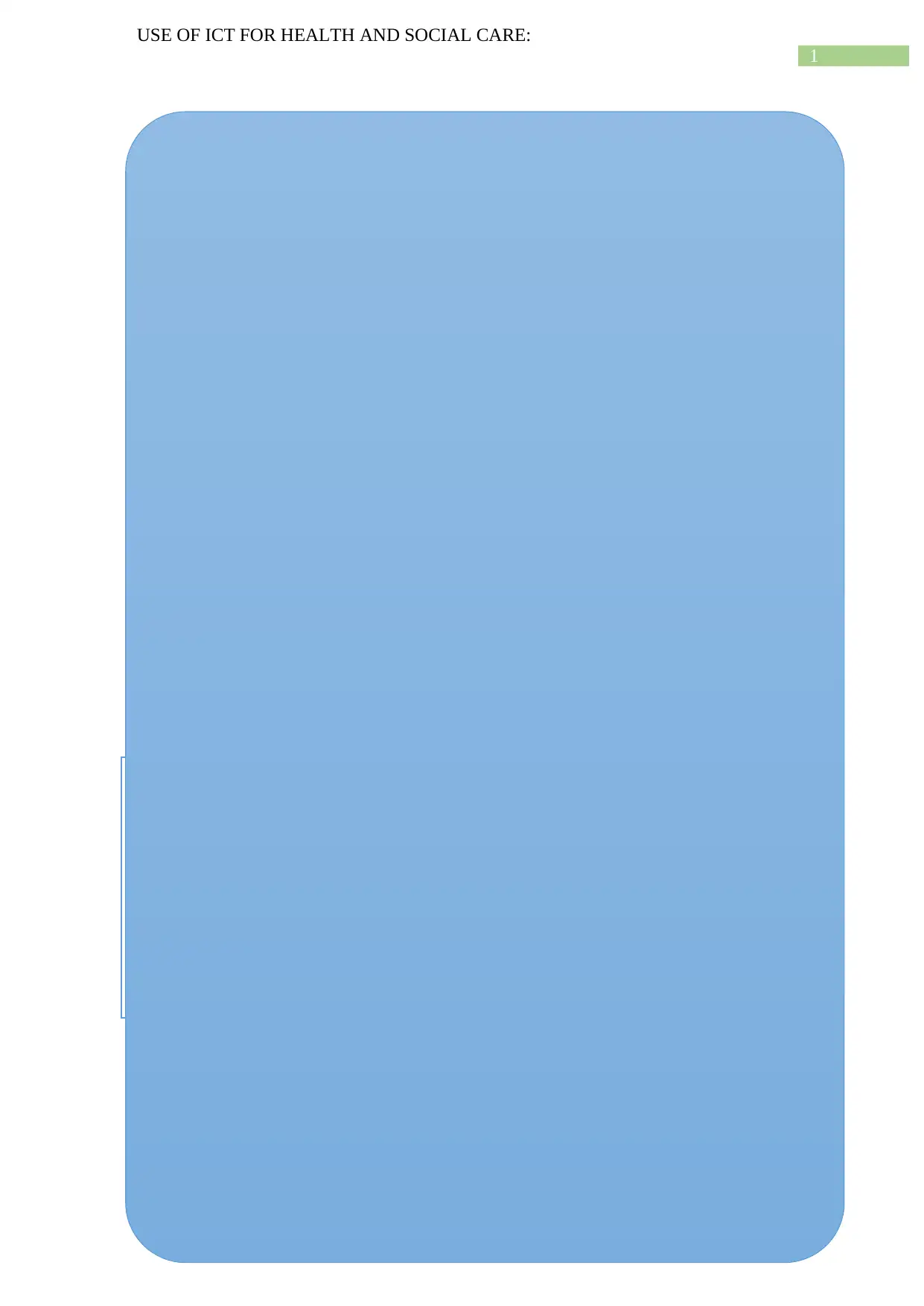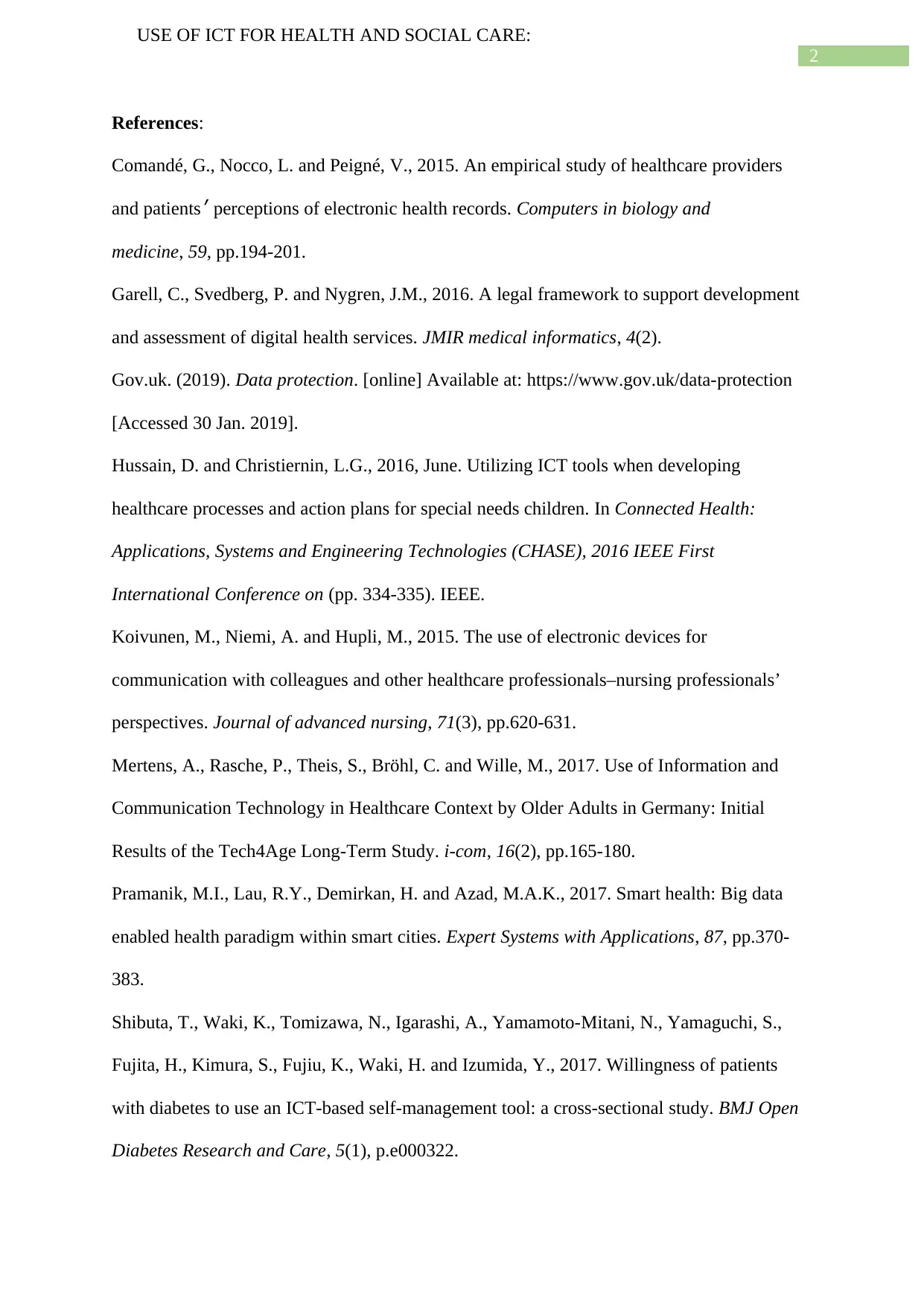Benefits and Ethical Issues of ICT in Health and Social Care - HND
VerifiedAdded on 2023/04/25
|3
|1390
|487
Report
AI Summary
This report explores the application of Information and Communication Technology (ICT) within the health and social care sectors. It begins with an introduction highlighting the benefits of ICT, such as improved communication and access to information, including specific examples like Electronic Health Records (EHRs). The report examines the impact of ICT on communication, with a personal reflection on the use of EHRs. It also discusses the benefits of ICT for users of services, care workers, and care organizations, focusing on enhanced care delivery and reduced errors. Furthermore, it addresses ethical and legal considerations associated with ICT usage, particularly regarding confidentiality, data protection, and ownership of information. The report concludes by referencing key sources to support the findings and discussions on the effective use of ICT in health and social care.

Running head: USE OF ICT FOR HEALTH AND SOCIAL CARE:
Use of ICT for health and social care:
Name of the student:
Name of the university:
Author note:
Use of ICT for health and social care:
Name of the student:
Name of the university:
Author note:
Paraphrase This Document
Need a fresh take? Get an instant paraphrase of this document with our AI Paraphraser

1
USE OF ICT FOR HEALTH AND SOCIAL CARE:
Use of ICT software packages in health and social
care
Introduction:
ICT packages provide an excellent
opportunity for the nurses to address and
overcome any communication gap
(Koivunen, Niemi and Hupli 2015).
It provides an extensive technique to
incorporate evidence based care delivery
in the health and social acre scenario.
The implementation of ICT helps in
enhancing the safety and efficacy of the
care service delivery scenario, and reduce
errors.
Few of the most commonly used ICT
software improving health includes
Electronic health records, electronic
medical records, personal health records,
Professional Clinical Informatics, etc
(Mertens et al. 2017).
Benefits of using ICT in health and social
care (LO 3.1):
Implementation of ICT can reform the
communication and interaction in the health
and social care delivery.
ICT helps in improving the access to
information and managing that information
drastically (Shibuta et al. 2017).
It also helps in identifying the process of
diagnosis, mapping of public health
priorities, training and sharing of knowledge
among health workers, and supporting health
workers in primary health care, particularly
rural and remote locations.
It helps in improving patient information,
interactive communication, media
approaches, health research, and advocacy to
improve services (Hussain, D. and
Christiernin 2016).
Impact of ICT on communication within health and social care (LO
3.1):
One of the greatest benefit of using ICT software in health and social care
context is to enhance the interpersonal communication between the care
professionals (Pramanik et al. 2017).
In most cases, the lack of any effective communication between the nurses,
physicians, and other care professionals, so that each of the care needs.
Similarly, communication between health care professional and the patients
also is improved drastically, especially for the intellectually disabled target
patient group (Comandé, Nocco and Peigné 2015).
ICT also helps in incorporating evidence based principles into care planning
and implementation so that any medical error can be avoided.
Benefits of ICT for users of services, care workers and care organisations (LO 3.2)
For users:
The users get the benefit of a digital
access to the care services provided and
the progress of the care services
(Pramanik et al. 2017).
Similarly, the users gain a better
understanding of the exactly how to
proceed with the care decision making.
Enhancing transparency of the care
services and the cost.
ICT devices such as telemedicine or tele-
health provides remote access to health
care
For care workers:
For the care workers, the ICT devices
help in eradicating all communication
barriers (Shibuta et al. 2017).
ICT devices such as HER or EMR
help in streamlining care service
delivery and reduces errors.
ICT devices help nurses implement
evidence based practice into care
(Pramanik et al. 2017).
Eases care cue collection, analysis and
interpretation.
For care organization:
The care organizations also benefit drastically
from the implementation of ICTs.
The ICTs help in reducing the frequency of
medical errors and any care service mishaps
(Shibuta et al. 2017).
The EHR and EMR services enhance
transparency and access, which in turn
improves the consumer satisfaction.
Clinical information system enhances
evidence based practice of care professionals,
which in turn improves care quality and
safety, enhancing reputation (Koivunen,
Niemi and Hupli 2015).
Ethical and legal issues in ICT (LO 3.3):
There also are a varied range of ethical and legal considerations associated with the usage of ICT in health and
social care.
Confidentiality is a major concern for ICT devices, especially in case of EHR and EMR devices which in turn
violates the patients’ rights of protecting the privacy of their personal information (Garell, Svedberg and Nygren
2016).
The next ethical aspect which can be potentially violated by the ICT implementation is ownership and
responsibility of the private information.
ICTs can potentially violate the Data Protection Act 1988 in which it is crucial for the private information of the
patents is to be protected, although the ICT software includes the data in an interface where all of the care
professionals can access it, which can violate the rights of the patients (Gov.uk 2019).
Personal use of ICT:
In this context, I would like to mention the fact that I myself have
used EHRs, the most commonly used ICT device in the organization. I myself
have noticed that the implementation of the ICT software eased the process of care
cue collection, assessment of the cues and implementation of the data top arrive at
a concrete verdict regarding the diagnosis. The EHRs also had been extremely
helpful in aligning all the past medical data regarding the patient and even during
medication administration, accessing the HER provided enough information on the
exact dosage and route of administration which is a very crucial area of challenge
for the nurses that are transitioning into care and have limited experience. Along
with that, EHRs substitute the handover charts which was the source of many
errors due to miscommunication and misinterpretation of the information or data.
Overall, as per my experience, EHRs are one of the most easily applicable ICT
devices which easily improves the care service quality and safety along with
easing the care delivery process for the care providers.
USE OF ICT FOR HEALTH AND SOCIAL CARE:
Use of ICT software packages in health and social
care
Introduction:
ICT packages provide an excellent
opportunity for the nurses to address and
overcome any communication gap
(Koivunen, Niemi and Hupli 2015).
It provides an extensive technique to
incorporate evidence based care delivery
in the health and social acre scenario.
The implementation of ICT helps in
enhancing the safety and efficacy of the
care service delivery scenario, and reduce
errors.
Few of the most commonly used ICT
software improving health includes
Electronic health records, electronic
medical records, personal health records,
Professional Clinical Informatics, etc
(Mertens et al. 2017).
Benefits of using ICT in health and social
care (LO 3.1):
Implementation of ICT can reform the
communication and interaction in the health
and social care delivery.
ICT helps in improving the access to
information and managing that information
drastically (Shibuta et al. 2017).
It also helps in identifying the process of
diagnosis, mapping of public health
priorities, training and sharing of knowledge
among health workers, and supporting health
workers in primary health care, particularly
rural and remote locations.
It helps in improving patient information,
interactive communication, media
approaches, health research, and advocacy to
improve services (Hussain, D. and
Christiernin 2016).
Impact of ICT on communication within health and social care (LO
3.1):
One of the greatest benefit of using ICT software in health and social care
context is to enhance the interpersonal communication between the care
professionals (Pramanik et al. 2017).
In most cases, the lack of any effective communication between the nurses,
physicians, and other care professionals, so that each of the care needs.
Similarly, communication between health care professional and the patients
also is improved drastically, especially for the intellectually disabled target
patient group (Comandé, Nocco and Peigné 2015).
ICT also helps in incorporating evidence based principles into care planning
and implementation so that any medical error can be avoided.
Benefits of ICT for users of services, care workers and care organisations (LO 3.2)
For users:
The users get the benefit of a digital
access to the care services provided and
the progress of the care services
(Pramanik et al. 2017).
Similarly, the users gain a better
understanding of the exactly how to
proceed with the care decision making.
Enhancing transparency of the care
services and the cost.
ICT devices such as telemedicine or tele-
health provides remote access to health
care
For care workers:
For the care workers, the ICT devices
help in eradicating all communication
barriers (Shibuta et al. 2017).
ICT devices such as HER or EMR
help in streamlining care service
delivery and reduces errors.
ICT devices help nurses implement
evidence based practice into care
(Pramanik et al. 2017).
Eases care cue collection, analysis and
interpretation.
For care organization:
The care organizations also benefit drastically
from the implementation of ICTs.
The ICTs help in reducing the frequency of
medical errors and any care service mishaps
(Shibuta et al. 2017).
The EHR and EMR services enhance
transparency and access, which in turn
improves the consumer satisfaction.
Clinical information system enhances
evidence based practice of care professionals,
which in turn improves care quality and
safety, enhancing reputation (Koivunen,
Niemi and Hupli 2015).
Ethical and legal issues in ICT (LO 3.3):
There also are a varied range of ethical and legal considerations associated with the usage of ICT in health and
social care.
Confidentiality is a major concern for ICT devices, especially in case of EHR and EMR devices which in turn
violates the patients’ rights of protecting the privacy of their personal information (Garell, Svedberg and Nygren
2016).
The next ethical aspect which can be potentially violated by the ICT implementation is ownership and
responsibility of the private information.
ICTs can potentially violate the Data Protection Act 1988 in which it is crucial for the private information of the
patents is to be protected, although the ICT software includes the data in an interface where all of the care
professionals can access it, which can violate the rights of the patients (Gov.uk 2019).
Personal use of ICT:
In this context, I would like to mention the fact that I myself have
used EHRs, the most commonly used ICT device in the organization. I myself
have noticed that the implementation of the ICT software eased the process of care
cue collection, assessment of the cues and implementation of the data top arrive at
a concrete verdict regarding the diagnosis. The EHRs also had been extremely
helpful in aligning all the past medical data regarding the patient and even during
medication administration, accessing the HER provided enough information on the
exact dosage and route of administration which is a very crucial area of challenge
for the nurses that are transitioning into care and have limited experience. Along
with that, EHRs substitute the handover charts which was the source of many
errors due to miscommunication and misinterpretation of the information or data.
Overall, as per my experience, EHRs are one of the most easily applicable ICT
devices which easily improves the care service quality and safety along with
easing the care delivery process for the care providers.

2
USE OF ICT FOR HEALTH AND SOCIAL CARE:
References:
Comandé, G., Nocco, L. and Peigné, V., 2015. An empirical study of healthcare providers
and patients׳ perceptions of electronic health records. Computers in biology and
medicine, 59, pp.194-201.
Garell, C., Svedberg, P. and Nygren, J.M., 2016. A legal framework to support development
and assessment of digital health services. JMIR medical informatics, 4(2).
Gov.uk. (2019). Data protection. [online] Available at: https://www.gov.uk/data-protection
[Accessed 30 Jan. 2019].
Hussain, D. and Christiernin, L.G., 2016, June. Utilizing ICT tools when developing
healthcare processes and action plans for special needs children. In Connected Health:
Applications, Systems and Engineering Technologies (CHASE), 2016 IEEE First
International Conference on (pp. 334-335). IEEE.
Koivunen, M., Niemi, A. and Hupli, M., 2015. The use of electronic devices for
communication with colleagues and other healthcare professionals–nursing professionals’
perspectives. Journal of advanced nursing, 71(3), pp.620-631.
Mertens, A., Rasche, P., Theis, S., Bröhl, C. and Wille, M., 2017. Use of Information and
Communication Technology in Healthcare Context by Older Adults in Germany: Initial
Results of the Tech4Age Long-Term Study. i-com, 16(2), pp.165-180.
Pramanik, M.I., Lau, R.Y., Demirkan, H. and Azad, M.A.K., 2017. Smart health: Big data
enabled health paradigm within smart cities. Expert Systems with Applications, 87, pp.370-
383.
Shibuta, T., Waki, K., Tomizawa, N., Igarashi, A., Yamamoto-Mitani, N., Yamaguchi, S.,
Fujita, H., Kimura, S., Fujiu, K., Waki, H. and Izumida, Y., 2017. Willingness of patients
with diabetes to use an ICT-based self-management tool: a cross-sectional study. BMJ Open
Diabetes Research and Care, 5(1), p.e000322.
USE OF ICT FOR HEALTH AND SOCIAL CARE:
References:
Comandé, G., Nocco, L. and Peigné, V., 2015. An empirical study of healthcare providers
and patients׳ perceptions of electronic health records. Computers in biology and
medicine, 59, pp.194-201.
Garell, C., Svedberg, P. and Nygren, J.M., 2016. A legal framework to support development
and assessment of digital health services. JMIR medical informatics, 4(2).
Gov.uk. (2019). Data protection. [online] Available at: https://www.gov.uk/data-protection
[Accessed 30 Jan. 2019].
Hussain, D. and Christiernin, L.G., 2016, June. Utilizing ICT tools when developing
healthcare processes and action plans for special needs children. In Connected Health:
Applications, Systems and Engineering Technologies (CHASE), 2016 IEEE First
International Conference on (pp. 334-335). IEEE.
Koivunen, M., Niemi, A. and Hupli, M., 2015. The use of electronic devices for
communication with colleagues and other healthcare professionals–nursing professionals’
perspectives. Journal of advanced nursing, 71(3), pp.620-631.
Mertens, A., Rasche, P., Theis, S., Bröhl, C. and Wille, M., 2017. Use of Information and
Communication Technology in Healthcare Context by Older Adults in Germany: Initial
Results of the Tech4Age Long-Term Study. i-com, 16(2), pp.165-180.
Pramanik, M.I., Lau, R.Y., Demirkan, H. and Azad, M.A.K., 2017. Smart health: Big data
enabled health paradigm within smart cities. Expert Systems with Applications, 87, pp.370-
383.
Shibuta, T., Waki, K., Tomizawa, N., Igarashi, A., Yamamoto-Mitani, N., Yamaguchi, S.,
Fujita, H., Kimura, S., Fujiu, K., Waki, H. and Izumida, Y., 2017. Willingness of patients
with diabetes to use an ICT-based self-management tool: a cross-sectional study. BMJ Open
Diabetes Research and Care, 5(1), p.e000322.
⊘ This is a preview!⊘
Do you want full access?
Subscribe today to unlock all pages.

Trusted by 1+ million students worldwide
1 out of 3
Related Documents
Your All-in-One AI-Powered Toolkit for Academic Success.
+13062052269
info@desklib.com
Available 24*7 on WhatsApp / Email
![[object Object]](/_next/static/media/star-bottom.7253800d.svg)
Unlock your academic potential
Copyright © 2020–2026 A2Z Services. All Rights Reserved. Developed and managed by ZUCOL.




